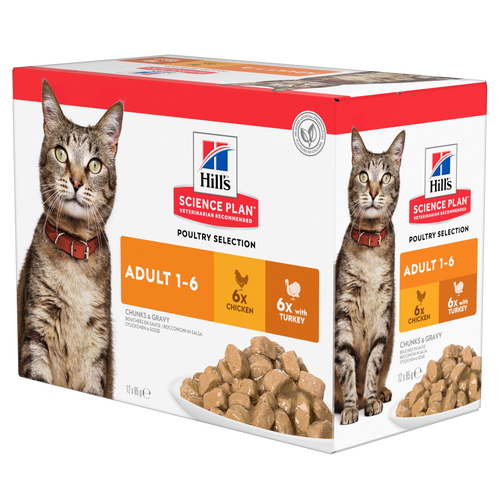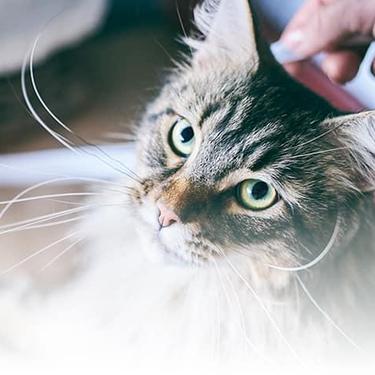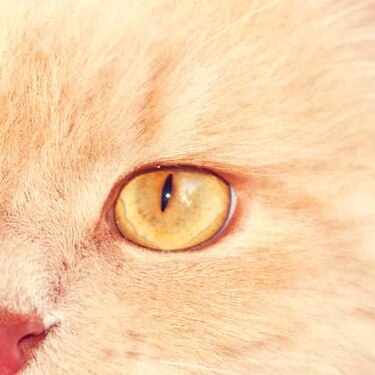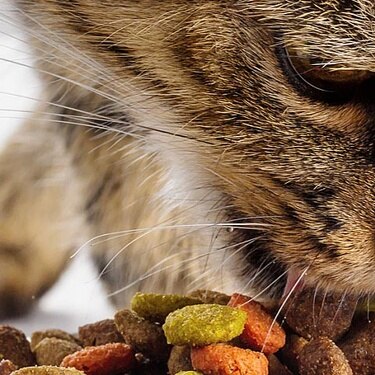
-
Find the right food for your petTake this quiz to see which food may be the best for your furry friend.Find the right food for your petTake this quiz to see which food may be the best for your furry friend.Featured products
 Adult Wet Dog Food with Beef
Adult Wet Dog Food with BeefHill's Science Plan Adult Multipack Wet Dog Food with Chicken, Beef & Turkey are complete premium pet foods for adult dogs from 1 year. Your dog will love these deliciously smooth and savoury minced loaves, formulated for balanced nutrition and overall health.
Shop Now Puppy Food
Puppy FoodHill's Science Plan Puppy Multipack Wet Dog Food with Chicken & Beef are complete premium pet foods for growing puppies from weaning until 1 year old and for pregnant and nursing dogs. Your puppy will love these deliciously smooth and savoury minced loaves, formulated for balanced nutrition and overall health.
Shop Now Mature Adult Dog Food
Mature Adult Dog FoodHill's Science Plan Mature Adult Multipack Wet Dog Food with Chicken & Beef are complete premium pet foods for mature adult dogs from 7 years. Your dog will love these deliciously smooth and savoury minced loaves, formulated to deliver the appropriate amount of energy to support the needs of adult dogs.
Shop NowFeatured products Mature Adult Wet Cat Food with Chicken
Mature Adult Wet Cat Food with Chicken
Tender chicken chunks in gravy for mature adult cats. Made with easy-to-digest ingredients, high-quality protein for lean muscle maintenance and antioxidant vitamins C+E for optimal health.
Shop Now Light Adult Multipack Wet Cat Food with Chicken & Ocean Fish
Light Adult Multipack Wet Cat Food with Chicken & Ocean FishTender chicken chunks in gravy for cats, with L-carnitine and fewer calories for ideal weight management. Packed with high-quality protein, omega-6s, and vitamin E for shiny fur and healthy skin.
Shop Now Adult Multipack Wet Cat Food with Beef, Ocean Fish & Chicken
Adult Multipack Wet Cat Food with Beef, Ocean Fish & ChickenTender chunks in gravy for cats, with high-quality protein to maintain lean muscle. With vitamin E and omega-3s & -6s for healthy skin and balanced minerals to support healthy vital organs.
Shop Now -
Dog
- Dog Tips & Articles
-
Health Category
- Weight
- Food & Environmental Sensitivities
- Urinary
- Digestive
- Joint
- Kidney
-
Life Stage
- Puppy Nutrition
- Adult Nutrition
- Senior Nutrition
Cat- Cat Tips & Articles
-
Health Category
- Weight
- Skin & Food Sensitivities
- Urinary
- Digestive
- Kidney
-
Life Stage
- Kitten Nutrition
- Adult Nutrition
Featured articles Show some love with wet foods: a great choice for pets with health issues
Show some love with wet foods: a great choice for pets with health issuesShow some love with wet foods: a great choice for pets with health issues.
Read More The Incredible Science Behind Your Pet's Microbiome
The Incredible Science Behind Your Pet's MicrobiomeLearn what your pet's microbiome is, how it contributes to your pet's gut and overall health, and why nutrition is important in maintaining healthy microbiomes.
Read More The Right Diet For Your Pet
The Right Diet For Your PetIn people, the right diet is very important. If you are eating the wrong way for your metabolism, activity level, age and lifestyle you could end up with health issues.
Read More -


When you adopt a cat from an animal shelter, you don't just gain a best friend; you are also saving a life. Research suggests that at least 131,000 cats enter UK shelters per year, a number that is thought to have increased after the COVID-19 lockdowns were lifted. With so many wonderful cats to choose from, getting a rescue cat from a local animal shelter makes so much sense.
Where to adopt a rescue cat
You have lots of options when looking to adopt a rescue cat. Large animal welfare charities like Cats Protection, RSPCA, Battersea Cats’ Home, and Blue Cross have centres all over the UK. Your new feline friend will usually be vaccinated, microchipped and spayed or neutered before adoption, or these services may be provided for a small fee. You can also search the Association of Cats and Dogs Homes (ACDH) database to find shelters in your area, including specialised shelters that care for specific breeds of cats or those with certain needs, e.g. senior, “orphaned” or disabled cats.
Each facility sets its own adoption guidelines and fees, so check with your local shelter for more information on how to adopt a cat and what you need to do before you bring them home.
Are Shelter Cats Problem Cats?
Not even close! While some cats may be relinquished as a result of behavioural problems, many cats often end up at animal shelters through no fault of their own. In fact, the most common reasons involve their former parents. They may have a change of circumstances that means they can no longer take care of the cat, such as moving into a new home where cats aren’t allowed, or moving in with someone who is allergic to cats. Illness or the passing of a pet parent are other unfortunate reasons a cat may end up in a shelter. Whatever the case, most shelters will gladly reveal the reason why a particular cat is up for adoption and can give advice on how to best integrate a potential pet into your home.
Why Adopt from a Shelter?
Cats in need of a new home are often the perfect choice for first-time pet parents. Most of these cats have already lived inside, and therefore know the routines of a household like yours. Animal shelters provide a wide range of cats to choose from too, allowing you to find the perfect companion for your lifestyle.
Knowing what to expect, or at least what a given cat has been exposed to in the past, is another great benefit of adopting an adult cat from a rescue shelter. Most shelters will take note of the temperament of resident cats and keep a record of background information for owner-surrendered animals. They can then use this information to help you find your best match.
Finding your match
When looking for a great rescue cat at your local animal shelter, a cat who best fits in with your home, family and lifestyle should be your number-one priority. Reputable shelters will only adopt out healthy animals, though some of these may have special needs such as a specific diet, daily medication or modifications in the home. Be sure to clarify these with shelter staff before you fall in love with a cat that you may not be able to care for optimally.
Spend some time with the cats so that you get a feel for their individual personalities. Be willing to listen to the advice of shelter staff and volunteers who have spent lots of time with the cats.


Tasty Tips
The Adoption Process
Each shelter has a different process for adopting cats, so check the organisation's website (or call them) for specifics before you go. The following steps are pretty common parts of the process:
- Some shelters require forms that include a vet's name, phone number, and references. Look for a local vet even before you contact the shelter so you have this information on hand.
- Often, available cats are featured on the shelter's website. If you see a cat you like, call ahead to make sure they are still living there.
- Make an appointment to visit the shelter and meet the cat.
- Bring your driver's licence or similar proof of your address and residency. You'll also need the means to pay the adoption fee.
- Some shelters offer a simple cardboard carrier so that you can bring your cat home, but if you have your own cat carrier, bring it along. Cats should always be allowed to ride in a sturdy carrier to keep them safe..
- Some shelters request a 24-hour waiting period, so you may not be able to bring the cat home right away. Keep in mind that this gives you time to think about your decision, and gives the shelter time to conduct a background check that confirms you're the gentle, reliable owner you know you are.
- You may be asked to complete an adoption contract, which stipulates the conditions under which you can keep your cat. For example, you may be required to have the cat spayed or neutered, and kept up to date on vaccinations. You may also be asked to bring your cat back to the shelter if you need to rehome them for any reason.
- Finally, bring your cat home. Have a litter box, food, and water bowl set up in just one room; it's helpful to keep them confined to one area of the house for the first few days until they get used to the environment. Provide plenty of toys and places to hide, such as a cardboard box or soft-sided sleeping cube.
Know the Costs Beforehand
Getting a cat is a big commitment. As a parent and guardian, you'll be responsible for your cat’s wellbeing for the rest of their life. Knowing the costs and time commitments for cat ownership is an important part of the adoption process.
Adoption fees are your primary initial investment, and range from around £35-£60. This usually goes towards the cost of spaying/neutering, microchipping and/or vaccinating your cat, although some shelters may require you to pay for these services separately or arrange them yourself. The following is a rough estimate of what you can expect to pay, but it’s wise to contact local vets in your area for a more accurate picture:
- Spaying/neutering – £40 - £100.
- Vaccinations – £50 - £120.
- Microchipping – approximately £25.
The Battersea Cats Home recommends budgeting around £120 per year for routine health care, which includes flea treatments, worming, annual vaccination boosters, and a yearly wellbeing visit to the vet. They also estimate around £24 per month for pet insurance to cover any unexpected accidents, injuries or illnesses.
The Day-to-Day
Good-quality cat food provides all of the nutrients your cat needs to stay healthy. Depending on the size, breed, age and health needs of your cat, Battersea Cats Home says you can expect to pay £20-£55 per month for food. You may also need to buy food and water bowls for a one-off cost of £10-£20.
Other essentials include things like litter, toys and a bed. Battersea Cats Home gives the following estimates:
- Litter – £20-£20 per month.
- Litter box – £10-£25.
- Cat bed – £20.
- Cat carrier – £25.
- Toys/puzzle feeders – £40.
- Scratching post – £30-£50.
Grooming
Cats usually groom themselves, but brushing your cat’s coat regularly helps to reduce the amount of hair they swallow, which can lead to hair balls. You can get a good-quality grooming brush for around £10. If they’re a long-haired kitty, they may need regular grooming appointments with a professional to keep their coats soft and tangle-free.
Grooming starts at around £25, depending on the size and breed of your cat and your location.
You will also need to trim your cat’s claws regularly to help keep them from scratching you or your floors (you know how much they love digging into the carpet!).
What about a time commitment? You don't need to walk your cat, but you should look forward to spending quality time each day with your adorable friend. Grooming, playing, feeding, and simply enjoying your time with them is essential to creating that special bond with your newest family member.
Cats offer companionship, affection, and enjoyment, and they ask so little in return. So, adopt a rescue cat. As they say, this could be the start of a beautiful friendship.


One of our staff authors prepared this article for you
Related products

Tender chicken chunks in gravy for cats, with L-carnitine and fewer calories for ideal weight management. Packed with high-quality protein, omega-6s, and vitamin E for shiny fur and healthy skin.

Tender chicken chunks in gravy for mature adult cats. Made with easy-to-digest ingredients, high-quality protein for lean muscle maintenance and antioxidant vitamins C+E for optimal health.


Tender chunks in gravy for cats, with high-quality protein to maintain lean muscle. With vitamin E and omega-3s & -6s for healthy skin and balanced minerals to support healthy vital organs.
Related articles

There are three common ways to feed a cat. Each way has its advantages and disadvantages.

Learn how to make homemade cat treats that are healthy for your pet with this recipe from Hills Pet Nutrition.

Chocolate is known to be poisonous for dogs, but it can also be toxic for cats. Learn why chocolate is bad for cats & what to do if she's eaten it.

From essential vitamins & minerals to different types of meat, learn what to look for when choosing the best cat food for your feline.

Put your cat on a diet without them knowing
Our low calorie formula helps you control your cat's weight. It's packed with high-quality protein for building lean muscles, and made with purposeful ingredients for a flavourful, nutritious meal. Clinically proven antioxidants, Vitamin C+E, help promote a healthy immune system.
Put your cat on a diet without them knowing
Our low calorie formula helps you control your cat's weight. It's packed with high-quality protein for building lean muscles, and made with purposeful ingredients for a flavourful, nutritious meal. Clinically proven antioxidants, Vitamin C+E, help promote a healthy immune system.

